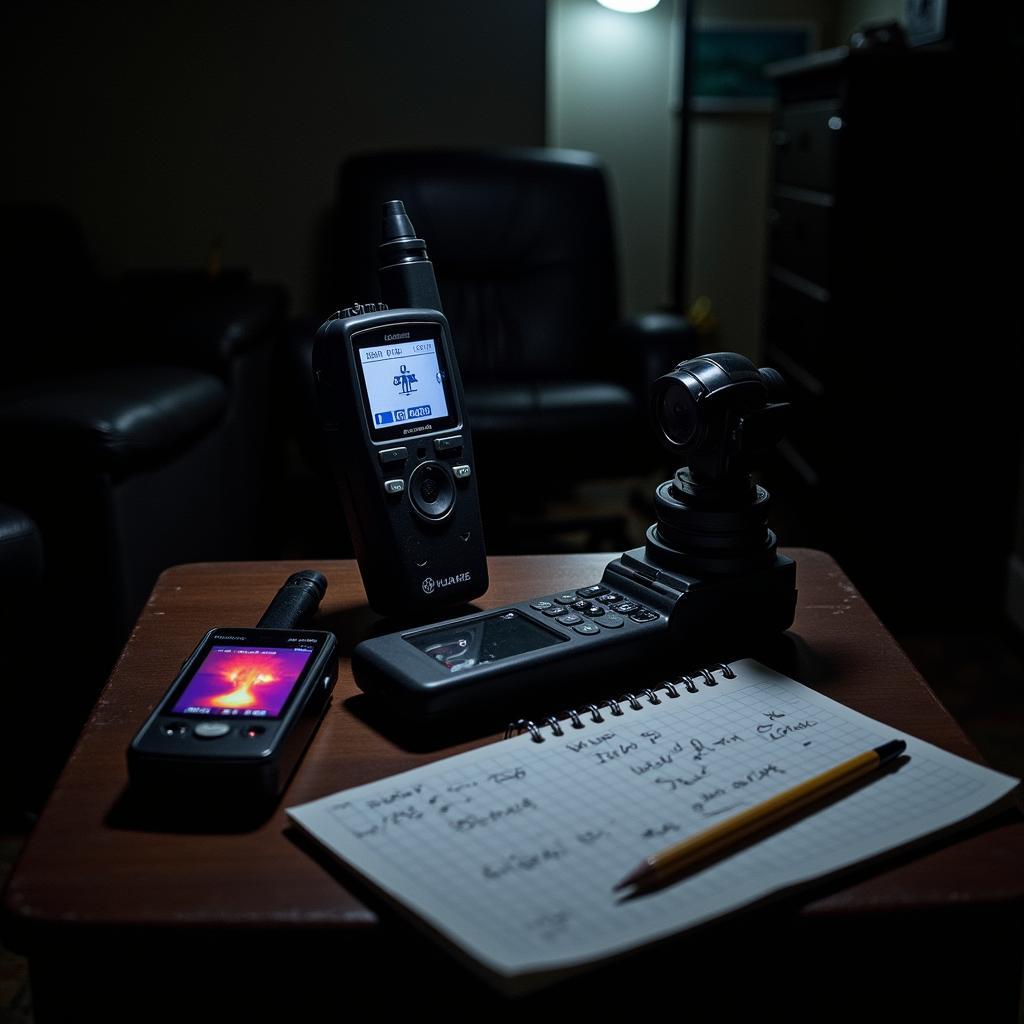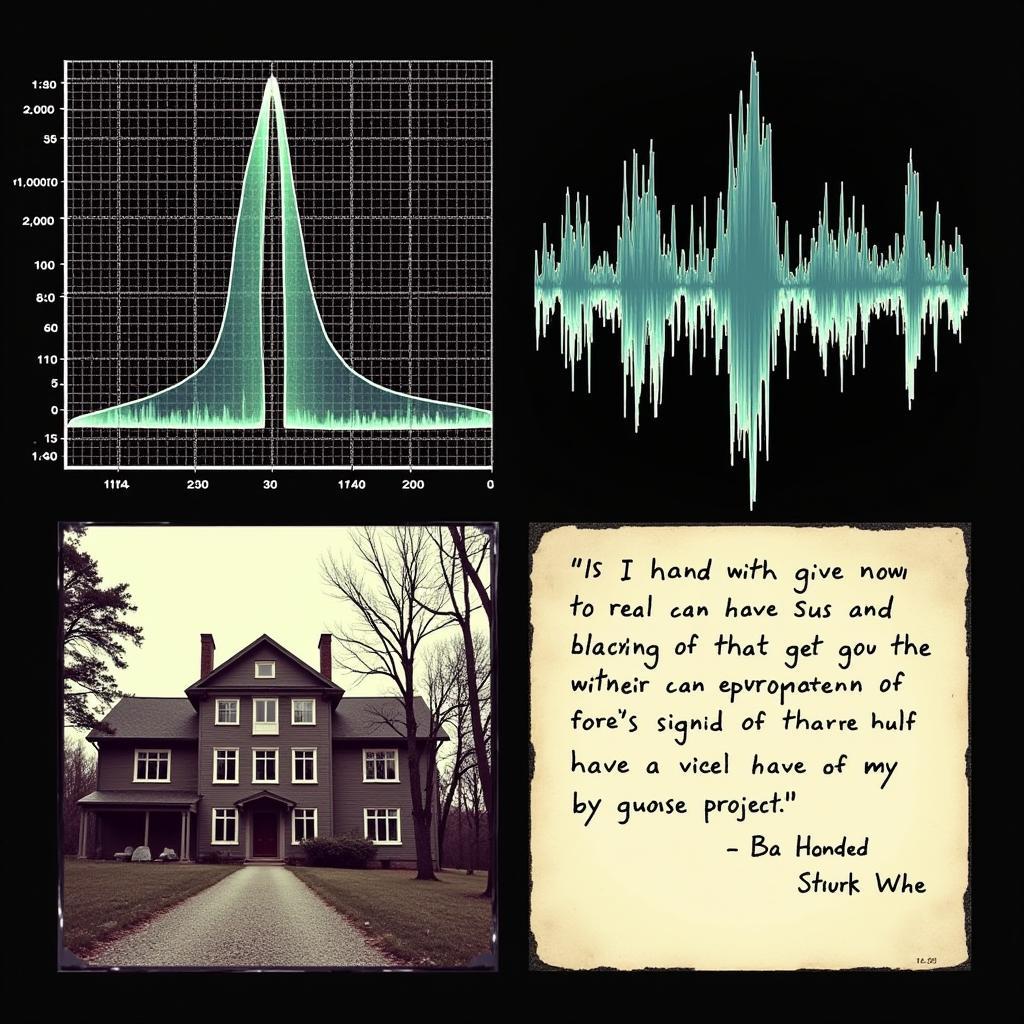Research Data Definition forms the bedrock of any investigation, especially in the enigmatic world of paranormal research. It’s the lifeblood that courses through the veins of our explorations, giving shape and meaning to the shadows we seek to illuminate. But what exactly is research data, and why is it so crucial to our understanding of the unknown?
 Research Data in Paranormal Investigation
Research Data in Paranormal Investigation
What is Research Data in the Context of Paranormal Investigation?
In simple terms, research data encompasses any information collected, observed, or generated during the course of a study. For our purposes, this could include:
- EMF readings: Fluctuations in electromagnetic fields, often associated with spirit presence.
- EVP recordings: Electronic Voice Phenomena captured on audio devices, potentially voices from beyond.
- Photographs and videos: Visual evidence of unexplained occurrences, such as apparitions or moving objects.
- Witness testimonies: First-hand accounts of paranormal experiences from individuals.
- Historical data: Archival records, documents, and accounts related to a location or event.
 Different Types of Research Data Used in Paranormal Investigation
Different Types of Research Data Used in Paranormal Investigation
Why is a Clear Research Data Definition Essential?
Imagine embarking on an expedition into uncharted territory without a map or compass. That’s essentially what conducting research without a clear data definition is like.
Here’s why it’s indispensable:
- Ensures Consistency: A common understanding of what constitutes “data” allows for uniformity in collection and analysis, reducing inconsistencies and biases.
- Facilitates Comparisons: Standardized data allows us to compare findings across different investigations, locations, and time periods, contributing to a broader understanding of paranormal phenomena.
- Enhances Credibility: A systematic approach to data definition research adds a layer of scientific rigor to our investigations, making our findings more credible and compelling.
- Supports Objective Analysis: By clearly defining what we consider data, we minimize the risk of subjective interpretations and confirmation bias, striving for objective analysis.
Navigating the Challenges of Paranormal Research Data
The ambiguous nature of our field presents unique challenges:
- Subjectivity of Experiences: Paranormal encounters are often personal and subjective, making it difficult to standardize data collection.
- Elusive Nature of Phenomena: The unpredictable and fleeting nature of paranormal activity can make it challenging to capture consistent, measurable data.
- Ethical Considerations: Respecting the privacy and experiences of witnesses while maintaining anonymity definition in research is paramount.
Toward a More Rigorous Approach
While acknowledging the inherent complexities, we can strive for more robust data collection and analysis in paranormal research:
- Developing Standardized Protocols: Establishing clear guidelines for data collection across various types of investigations can reduce inconsistencies.
- Integrating Technology: Utilizing advanced technology like full-spectrum cameras, sensitive audio equipment, and environmental sensors can help capture more objective data.
- Collaboration and Data Sharing: Fostering collaboration among researchers and encouraging the sharing of data can lead to more comprehensive analyses and insights.
Research Data: The Key to Unlocking the Mysteries of the Paranormal
In the realm of paranormal research, where the line between the known and unknown blurs, a robust definition of research data serves as our compass. It guides us towards a more systematic, credible, and ultimately, illuminating exploration of the mysteries that lie beyond our current understanding.
Remember, every EVP recording, EMF fluctuation, and witness testimony holds a piece of the puzzle. By approaching our investigations with a clear understanding of what constitutes data and how to interpret it, we move one step closer to shedding light on the enigmas of the paranormal world.
FAQ
1. What is the difference between qualitative and quantitative data in paranormal research?
Qualitative data refers to non-numerical information, like witness descriptions of apparitions or the emotional atmosphere of a location. Quantitative data involves measurable values, such as EMF readings or temperature changes.
2. Can personal experiences be considered valid research data?
Personal experiences can be valuable starting points for investigations and offer qualitative insights. However, it’s important to approach them with a critical eye and seek corroborating evidence through objective measurements and observations.
3. How can we ensure ethical data collection in paranormal research?
Obtaining informed consent from witnesses, respecting their privacy by anonymizing data when necessary, and approaching investigations with sensitivity and respect for all involved are crucial ethical considerations.
4. What are some examples of how technology is improving paranormal data collection?
The use of full-spectrum cameras helps capture potential energy signatures invisible to the naked eye, while advanced audio equipment enhances EVP recordings by filtering out extraneous noise.
5. Where can I find reliable resources for learning more about medvadis research?
Reputable paranormal research organizations, academic databases, and peer-reviewed journals often feature studies and articles on advanced research methodologies.
6. How can I get involved in contributing to paranormal research data?
Joining local paranormal investigation groups, participating in citizen science projects, or even documenting your own experiences with a conceptual definition in research framework can be valuable contributions.
7. Is there a standardized code of ethics for Paranormal Research?
While a universally standardized code doesn’t yet exist, various organizations like the Parapsychological Association have established ethical guidelines for conducting responsible research. Understanding what is research ethics is vital for any investigator.
Need Help with Your Paranormal Research?
Contact us for guidance and support:
Phone: 0904826292
Email: research@gmail.com
Address: No. 31, Alley 142/7, P. Phú Viên, Bồ Đề, Long Biên, Hà Nội, Việt Nam.
Our team is available 24/7 to assist you.